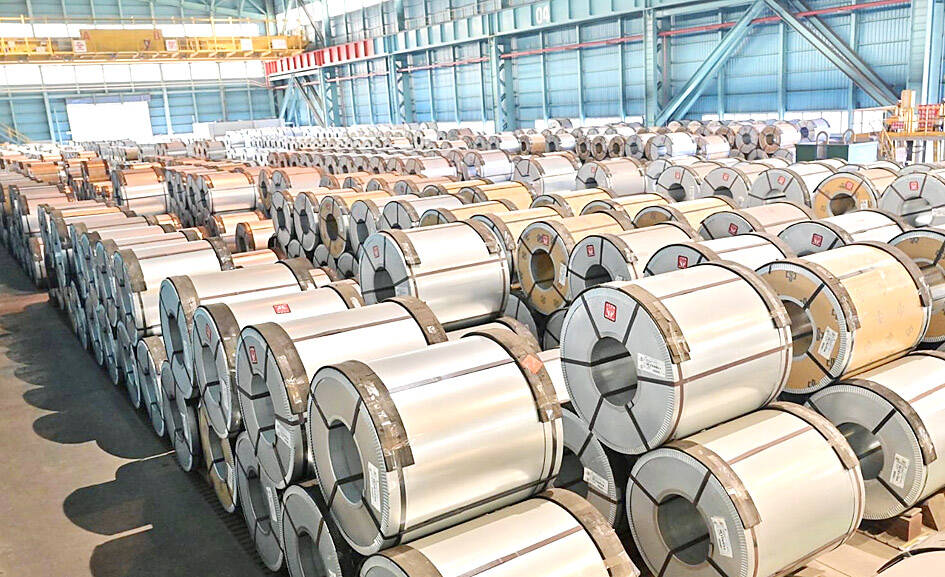A move by US President Donald Trump to slap a 25 percent tariff on all steel imports is expected to place Taiwan-made steel, which already has a 25 percent tariff, on an equal footing, the Taiwan Steel & Iron Industries Association said yesterday.
Speaking with CNA, association chairman Hwang Chien-chih (黃建智) said such an equal footing is expected to boost Taiwan’s competitive edge against other countries in the US market, describing the tariffs as "positive" for Taiwanese steel exporters.
On Monday, Trump signed two executive orders imposing the new metal tariffs on imported steel and aluminum with no exceptions and exemptions, effective next month.

Photo courtesy of China Steel Corp
According to foreign media reports, Taiwan ranked the eighth largest steel exporter to the US market last year, selling 1.01 million tonnes of steel products, behind Canada (6.56 million tonnes), Brazil (4.50 million tonnes) and Mexico (3.52 million tonnes).
Hwang, also chairman of China Steel Corp (中鋼), the largest steel maker in Taiwan, said the new executive orders, which will take away an exemption status from Canada, Mexico, Japan and the European Union, are expected to help Taiwan sell more steel products to the US.
The tariffs are also expected to push up steel prices in the US market, benefiting Taiwanese exporters, he said.
Prices of hot rolled steel products have risen to US$837 per tonne from US$767 since Trump took office on Jan. 20, and the prices could hit US$1,000 per tonne shortly due to the tariffs, he added.
Meanwhile, an executive from Yieh Phui Enterprise Co (燁輝), another major steel supplier in Taiwan, said the 25 percent tariffs mainly targeted the leading exporters such as Canada and Mexico, which enjoyed a large trade surplus with the US.
Once the new tariffs become effective, the executive said steel imports to the US market are expected to move lower, which could push up product prices there and allow Yieh Phui to improve its profitability. Currently, the US market accounts for half of the company’s total exports, he said
Chung Hung Steel Corp (中鴻), another Taiwanese steel maker, said the new tariffs will change the current unfair competition in the US market as many countries enjoy an exemption, a positive trend to Taiwan.
However, Hwang said Trump’s tariffs on steel could cut both ways for Taiwanese exporters.
He said these countries which will be taking away tariff exemption are likely to ship their products to other markets such as Asia or Europe at lower prices to make up the losses in sales in the US, which could place Taiwan under new competition.
He added as the new tariffs will not go into effect until March, Trump could change his mind before that, urging Taiwanese exporters to keep a close eye on the situation.

On Ireland’s blustery western seaboard, researchers are gleefully flying giant kites — not for fun, but in the hope of generating renewable electricity and sparking a “revolution” in wind energy. “We use a kite to capture the wind and a generator at the bottom of it that captures the power,” said Padraic Doherty of Kitepower, the Dutch firm behind the venture. At its test site in operation since September 2023 near the small town of Bangor Erris, the team transports the vast 60-square-meter kite from a hangar across the lunar-like bogland to a generator. The kite is then attached by a

Foxconn Technology Co (鴻準精密), a metal casing supplier owned by Hon Hai Precision Industry Co (鴻海精密), yesterday announced plans to invest US$1 billion in the US over the next decade as part of its business transformation strategy. The Apple Inc supplier said in a statement that its board approved the investment on Thursday, as part of a transformation strategy focused on precision mold development, smart manufacturing, robotics and advanced automation. The strategy would have a strong emphasis on artificial intelligence (AI), the company added. The company said it aims to build a flexible, intelligent production ecosystem to boost competitiveness and sustainability. Foxconn

Leading Taiwanese bicycle brands Giant Manufacturing Co (巨大機械) and Merida Industry Co (美利達工業) on Sunday said that they have adopted measures to mitigate the impact of the tariff policies of US President Donald Trump’s administration. The US announced at the beginning of this month that it would impose a 20 percent tariff on imported goods made in Taiwan, effective on Thursday last week. The tariff would be added to other pre-existing most-favored-nation duties and industry-specific trade remedy levy, which would bring the overall tariff on Taiwan-made bicycles to between 25.5 percent and 31 percent. However, Giant did not seem too perturbed by the

TARIFF CONCERNS: Semiconductor suppliers are tempering expectations for the traditionally strong third quarter, citing US tariff uncertainty and a stronger NT dollar Several Taiwanese semiconductor suppliers are taking a cautious view of the third quarter — typically a peak season for the industry — citing uncertainty over US tariffs and the stronger New Taiwan dollar. Smartphone chip designer MediaTek Inc (聯發科技) said that customers accelerated orders in the first half of the year to avoid potential tariffs threatened by US President Donald Trump’s administration. As a result, it anticipates weaker-than-usual peak-season demand in the third quarter. The US tariff plan, announced on April 2, initially proposed a 32 percent duty on Taiwanese goods. Its implementation was postponed by 90 days to July 9, then